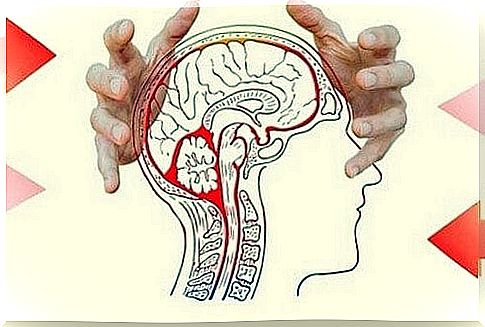How Does Worry Affect The Brain?

How worry affects the brain can be summed up in one word: toxically. Although this psychological reality is nothing more than a natural emotion when we perceive a threat, many of our concerns are unfounded and even obsessive, leading us to states of great exhaustion in which we lose energy and motivation.
One thing we know very well from a psychological point of view is that the effects of worrying too much can even be more dangerous than what really worries us. It sounds like a play on words, but it goes beyond that.
When we’re in those states where stress escalates and distorts down to the smallest detail, everything gets out of hand, we make the worst decisions, and emotional discomfort escalates.
For example, the more obsessed we become with our poor quality of sleep, the more insomnia we have. The more we care about showing ourselves to be effective and perfect in our work, the more we make mistakes.
Also, if we worry too much about our partner leaving us, we create situations where the other person feels more pressured and uncomfortable.
Thus, the more pressure we generate in our mind, the worse our brain will respond. We will use up all your resources, we will have more memory lapses and we will feel exhausted. Due to the biology of stress, the list of effects associated with excessive worry is immense.

How does worry affect the brain?
How worry affects the brain is more intense than we think.
Neuroscientists like Dr. Joseph LeDoux of New York University, point out that the impact of this dimension is so serious because the people in general do not know worry healthily. We have a curious tendency to take almost everything to the extreme.
However, they also point to another factor that perhaps relieves us of some of the blame. Our brain is programmed to worry first and think later. That is, our emotional system, and in particular our cerebral amygdala, are the first to detect a threat and activate an emotion in us.
Instantly, neurotransmitters such as dopamine are released to generate activation and nervousness. Subsequently, the limbic system stimulates the cerebral cortex to notify higher mental structures.
The purpose of this? Encourage him to take control, to use his logical reasoning to regulate that fear, that sense of alertness.
Dr. LeDoux reminds us that, in humans, emotions have more power than reason. Something like this makes the worries and the labyrinth of anxiety we commonly face take control of our minds.
The way in which worry affects the brain is therefore very intense, and the effects are as follows:
Excessive worry creates psychological pain
What do we mean by psychological pain? Is it different from physical pain? Effectively yes, but actually this difference is quite limited. Psychological pain is basically suffering, exhaustion, negativity, discouragement…
In an anxious brain dominated by constant worry, what controls us is the amygdala. It makes us see dangers where there are none. Everything is a threat, we distrust everything and everything generates fear.
Its hyperstimulation affects the cerebral cortex, reducing its activity. Therefore, we fail to see things calmer and more balanced.
In addition, the amygdala activates several areas of brain pain, such as the anterior cingulate cortex. In this way, the discomfort intensifies.

When worry affects the brain, your cognitive processes fail.
What do we mean when we talk about cognitive processes? When worry affects the brain intensely because we’ve been stuck in certain thoughts for weeks or months, we can begin to notice the following:
- Memory lapses.
- Concentration problems.
- Difficulty making decisions.
- Problems understanding messages, texts, etc.
What is the solution to stop worrying?
In fact, the key is not to stop worrying. The answer is to learn to care better. Otherwise, as a study conducted at Cambridge University by Dr. Ernest Paulesu explains, we are at risk of developing a generalized anxiety disorder.
To achieve this, to learn to care better, it is appropriate to remember the advice of prominent psychologist Albert Ellis. Let’s reflect on them for a moment:
- Analyze your irrational thoughts. Even if you don’t believe it, about 80% of your concerns are disproportionate and have no logical basis.
- Talk about your emotions, name them, unlink them, bring them to light. It’s possible that you’re worrying too much about your work because, in fact, you feel dissatisfied, because you’re not happy, because it doesn’t satisfy you. Go deeper into these ideas.
- Don’t make decisions based solely on your mood. Before deciding and acting, remain calm and pass every thought through the filter of reason. Emotions are important, but if combined with slow, focused thinking, you will always do better.

In conclusion, knowing how worry affects the brain, we learned to be more proactive. Let us avoid falling into these cycles of suffering and make use of healthier and more reasonable approaches. In case we do not succeed, let us not hesitate to contact specialized professionals.









